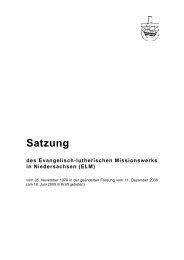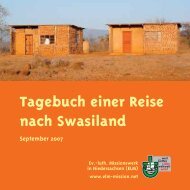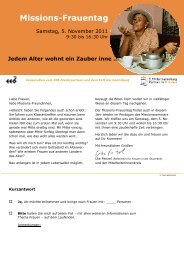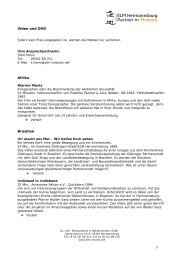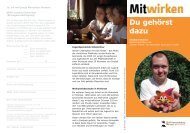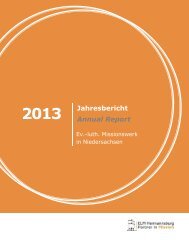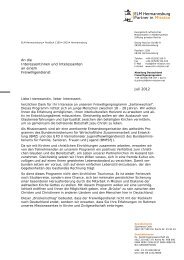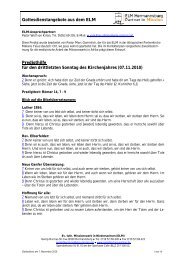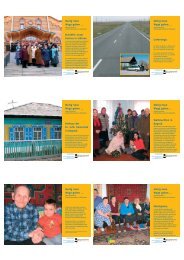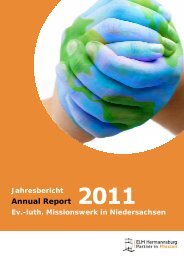Jahresbericht 2012 - Ev.-luth. Missionswerk in Niedersachsen
Jahresbericht 2012 - Ev.-luth. Missionswerk in Niedersachsen
Jahresbericht 2012 - Ev.-luth. Missionswerk in Niedersachsen
Sie wollen auch ein ePaper? Erhöhen Sie die Reichweite Ihrer Titel.
YUMPU macht aus Druck-PDFs automatisch weboptimierte ePaper, die Google liebt.
Arbeitsbereich<br />
Entwicklung als ökumenische<br />
Serviceagentur<br />
Development Operations<br />
as an Ecumenical Service<br />
Agency<br />
Im Rahmen der Umsetzung des neuen Profils „Partner<br />
<strong>in</strong> Mission“ entstanden unterschiedliche Arbeitsgruppen,<br />
<strong>in</strong> denen der Bereich „Entwicklung“ als Querschnittsthema<br />
e<strong>in</strong>fließen sollte. Wir haben <strong>in</strong> diesen<br />
Arbeitsgruppen Grundlagen für unsere Arbeit als<br />
„ökumenische Serviceagentur“ erarbeitet. Wichtig war<br />
uns dabei, den globalen Horizont <strong>in</strong> den Blick zu nehmen.<br />
Das heißt, unsere Partner und deren Lebenswelt<br />
dabei <strong>in</strong>s Zentrum zu rücken und die dort formulierten<br />
Notwendigkeiten <strong>in</strong>s Verhältnis zu setzen zu unseren<br />
Aufträgen und Zielen.<br />
Stategien für Länder und Kirchen entwickeln<br />
Ich möchte das am Beispiel der Entwicklung von Länderstrategiepapieren,<br />
die Teil von „Partner <strong>in</strong> Mission“<br />
s<strong>in</strong>d, verdeutlichen: Länderstrategiepapiere s<strong>in</strong>d<br />
Arbeitspapiere, <strong>in</strong> denen wir Begründungen für den<br />
Umfang und die Ausrichtung der Zusammenarbeit<br />
mit den Partnern im Ausland erarbeiten. Sie sollen<br />
Teil e<strong>in</strong>es kont<strong>in</strong>uierlichen Prozesses se<strong>in</strong> und beschreiben<br />
unsere Zusammenarbeit mit den Partnern.<br />
Regelmäßig werden die Strategiepapiere überarbeitet.<br />
– Warum s<strong>in</strong>d solche Strategien für uns wichtig geworden?<br />
Als spendenbezogen arbeitendes Werk, das drei<br />
Trägerkirchen untersteht und außerdem mit 18 Partnerkirchen<br />
zusammenarbeitet, stehen wir <strong>in</strong>mitten<br />
e<strong>in</strong>es komplexen Arbeitsfelds. Alle Beteiligten haben<br />
unterschiedliche Bedürfnisse und Interessen, die wir<br />
„unter e<strong>in</strong>en Hut“ br<strong>in</strong>gen müssen. Uns ist es dabei<br />
e<strong>in</strong>e Hilfe, für jedes Land die vielen Faktoren e<strong>in</strong>mal<br />
als „Zusammenschau“ darzustellen, um daraus Folgerungen<br />
für die konkreten Projekte und Programme zu<br />
ziehen. Dabei spielt unser Auftrag seitens der Trägerkirchen<br />
ebenso e<strong>in</strong>e Rolle wie die Berücksichtigung der<br />
„Ist“-Situation <strong>in</strong> den jeweiligen Ländern.<br />
Wir gehen <strong>in</strong> unseren Länderstrategiepapieren darauf<br />
e<strong>in</strong>, dass Mission nicht nur von der Kirchenlandschaft,<br />
sondern vom Gesamtkontext e<strong>in</strong>es Landes geprägt ist.<br />
Zum Beispiel der allgeme<strong>in</strong>en politischen und wirtschaftlichen<br />
Situation: Werden Kirchen z.B. seitens des<br />
Staates überhaupt <strong>in</strong> ihrer Arbeit zugelassen? Wie geht<br />
es den Menschen wirtschaftlich, mit denen wir zu tun<br />
haben? Oder dem Gefälle zwischen Stadt und Land: Wo<br />
s<strong>in</strong>d die Geme<strong>in</strong>den, mit denen wir zusammenarbeiten<br />
und mit welchen Themen beschäftigt man sich dort?<br />
Oder der Arbeitssituation: Wie viele Menschen haben<br />
überhaupt e<strong>in</strong> monatliches E<strong>in</strong>kommen und wenn ja,<br />
Dur<strong>in</strong>g implementation of the new profile, “Partner<br />
<strong>in</strong> Mission”, a number of the work groups that arose<br />
<strong>in</strong>corporated the area of “development” as a crosssectional<br />
theme. At these meet<strong>in</strong>gs we developed<br />
the basic pr<strong>in</strong>ciples for our work as an “ecumenical<br />
service agency”. The important th<strong>in</strong>g for us was that<br />
the global horizon be considered as well. That is, our<br />
partners and their environment were to be placed on<br />
center stage and their necessities as formulated by<br />
them were to be brought <strong>in</strong>to relationship with our<br />
tasks and goals.<br />
Develop<strong>in</strong>g Strategies for Countries and<br />
Churches<br />
I would like to clarify this us<strong>in</strong>g the example of the<br />
development of country strategy papers, which are<br />
an element of “Partner <strong>in</strong> Mission”: Country strategy<br />
papers are work papers <strong>in</strong> which we develop justifications<br />
for the scope and direction of cooperation with<br />
partners <strong>in</strong> countries outside Germany. These papers<br />
should be part of a cont<strong>in</strong>ual process and describe our<br />
work together with our partners. The strategy papers<br />
are revised on a regular basis. Why have such strategies<br />
become important for us? Our operat<strong>in</strong>g environment<br />
has become quite complex because the mission,<br />
which relies partly on donations, is subord<strong>in</strong>ate to<br />
three support<strong>in</strong>g churches and also works together<br />
with 18 partner churches. All parties <strong>in</strong>volved have different<br />
needs and <strong>in</strong>terests which we have to harmonize.<br />
It is helpful for us to have the many relevant factors<br />
for each country <strong>in</strong> a “summary” at our f<strong>in</strong>gertips<br />
so that we can draw conclusions for concrete projects<br />
and programs. In do<strong>in</strong>g so, we take account of both<br />
our mission from the support<strong>in</strong>g churches and the<br />
actual situation <strong>in</strong> each particular country.<br />
In our country strategy papers we expla<strong>in</strong> that mission<br />
is <strong>in</strong>fluenced not only by the church landscape<br />
but also by the overall situation <strong>in</strong> a country. For<br />
example, regard<strong>in</strong>g the overall political and economic<br />
situation: Are churches allowed, for example by the<br />
state, to operate at all? What is the economic situation<br />
of the people we deal with? Or, with regard to the<br />
difference between city and country: Where are the<br />
congregations located with whom we work together<br />
and which topics currently occupy the people there?<br />
Or with regard to the labor sector: How many people<br />
have a monthly <strong>in</strong>come at all and if they do, how long<br />
do they get by on it?<br />
33



